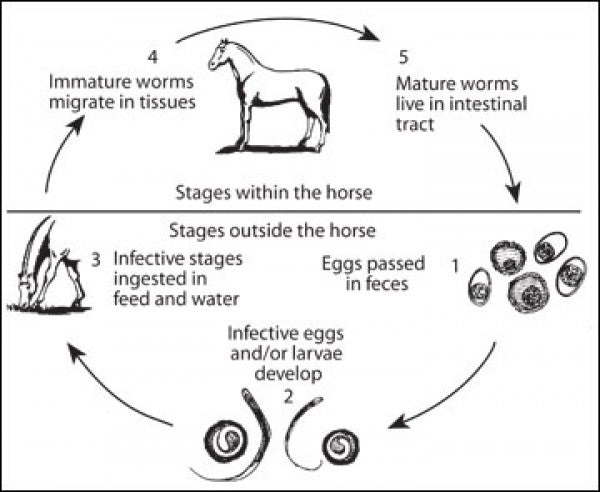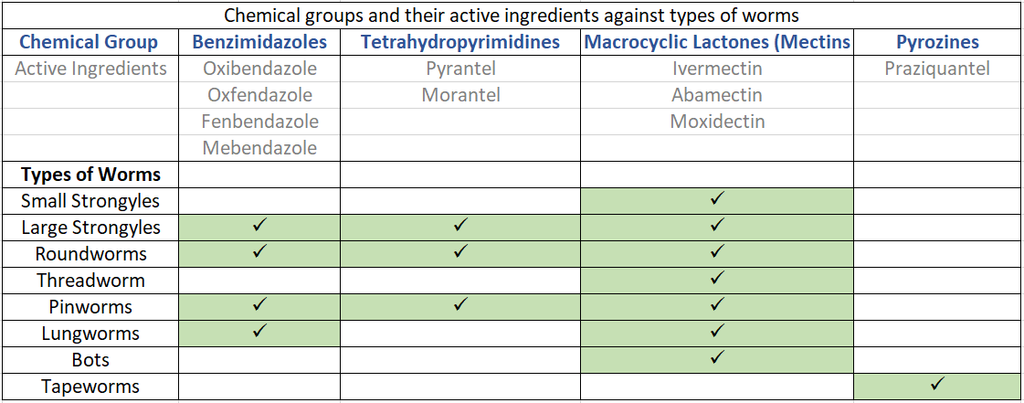Your Cart is empty
There are many types of worms, namely - strongyles, roundworms, tapeworm, pinworms, Lungworms, Threadworms and bots, we will try and help you understand how best to manage the deworming program for your horse.
Firstly, it is quite important to understand the lifecycles of these internal parasites.
Refer to the image below.
- Your horse passes manure
- In this manure are eggs, these worm eggs/larvae develop
- Your horse then eats the pasture near this manure, and swallows some eggs/larvae
- These worms are now back in the horses intestinal tract.

As you can understand, if these internal parasites (worms) are not managed or controlled the cycle gets worse and worse, as the egg count in the manure increases.
Internal Parasites are a significant threat to the health of horses. The horse is susceptible to numerous internal parasites and may harbour several species of worms at any given time.
The effects of internal parasites are more evident in young and malnourished horses. The effects of internal parasites on a horse range from not putting on weight, dull coat, reduced appetite, mild colic or anxiety and an itchy tail base. If left untreated symptoms can progress to include diarrhoea, anaemia, lethargy, susceptibility to infections, sores, coughing and colic.
Types of Worms and Chemicals Active Against Them

How to Control Worms?
- Pasture/Stable Management
- Effective de-worming programme
Pasture/Stable Management and Cleanliness
This involves removing manure that is lying around. This can be expensive, so in areas where the climate is hot and dry, you can spread out the manure and let is dry. This should be done regularly so that the larvae do not stay alive in the massed manure. Try and group horses according to age, this will reduce the risk of young horses coming into contact with heavy larvae infestations. Reducing numbers per paddock can also help control worm infestations. When feeding out always put food in tubs and hay in racks, not on the ground.
Effective Deworming Programme
It is best practice to got a FEC (Faecal Egg Count) done periodically, as this helps you determine the deworming medication needed. You would send a sample of manure to your veterinarian or other laboratory, they will do an egg count. You will get back a number like 50EPG or 500 EPG. (eggs per gram). Any number under 200 is regarded as low contamination, over 500EPG needs urgent de-worming treatment.
You should get this FEC test done on all new horses and then twice a year on mature horses.
Which Wormers to Use?…. This is a big question – often asked.
The thinking used to be that you must change your de-wormer every time you de-worm, however this is not the best practice as it makes it easier for the parasites to develop a resistance to the chemicals which are intended to kill them. While you should change the chemical group used, only do so every 3rd time – or based on your Vets assessment. Important…Changing the brand of wormer you use, does not necessarily mean you are changing the chemical group…you need to look at the active ingredients.
At Amacron Equine we have assessed the best recommended wormers: (Chemical Group in brackets)
-
Ammo – All Wormer (Macrocyclic Lactones & Tetrahydropyrimidines)
-
Ammo – Rotational Wormer (Benzimidazole group)
-
Strategy T – Rotational Wormer (Benzimidazole & Tetrahydropyrimidines)
-
Equimax – All wormer (Macrocyclic Lactones & Pyrozines)
Which one should I use and when?
In adult horses focus on stongyles control, which means either the Ammo All Wormer or the Equimax All Wormer, done every 6 months. We suggest using one these 2 wormers every 6 months, for 12 months, then switching to another Chemical group (either the Virbac Strategy-T or Ammo Rotational wormer).
SO – Simply….use Ammo All Wormer or Equimax All wormer every 6 months for 12 months. Then use either Strategy-T or Ammo Rotational Wormer, every 6 months for the next 12 months.
In Foals and weanlings, they should receive a minimum of four deworming treatments during their first year of life, the first one when they are 2-3 months of age, use a benzimidazole chemical for this first one, so use the Ammo Rotational wormer for this, the second deworming should be at 6 months of age – just before weaning. They then should have a deworming treatment at 9 and 12 months of age, both of these targeting Strongyles, so this means the Ammo All wormer or the Virbac Equimax.
Here is a table of our wormers showing the Chemical Groups and Actives

Diagram showing types of parasites and Chemicals designed to target them

Summary
Always go by your veterinary recommendations and FEC (Faecal Egg Count) readings to determine which wormer to use, however if you have not been able to get this done, we recommend the following:
Adult Horses
Use Ammo All Wormer or Equimax All Wormer every 6 months for 12 months. (make sure you use Equimax every now and again as it is the only wormer we have effective against tapeworms).
Then switch to Strategy-T or Ammo Rotational Wormer, every 6 months for the next 12 months. Then back again to the first set of wormers.
Foals and Weanlings
Use Ammo Rotational wormer for the first worming treatment at about 3 months and again at 6 months. At 9 and 12 months use the Virbac Equimax.
Written by Kelvin Sobey of Amacron Equine
Check out Amacron best horse wormer products available. VIEW HERE
Wormer buckets available qty (60 SYRINGES) view here
Contact us at Tel: 1300 791 653


